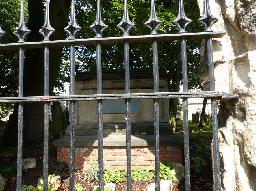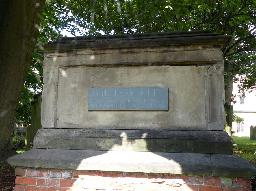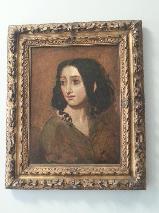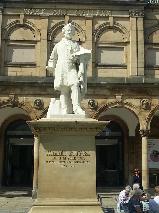Etty, William |
| PAINTER (ENGLAND) |
|
BORN 10 Mar 1787, York, North Yorkshire: Feasegate - DIED 13 Nov 1849, York, North Yorkshire GRAVE LOCATION York, North Yorkshire: St Olave's Churchyard (altar tomb in churchyard, next to Abbey ruins) |
|
William Etty was well known for his nudes and his still lifes. He was educated in York until in 1798 he became a printer's apprentice in Hull when he was eleven years old. After seven years his time there ended much to his relief and he joined his brother Walter in London in 1805. He was accepted by Fuseli as a pupil in the Schools of the Royal Academy in 1807. For a year he was a private pupil of Thomas Lawrence but to his frustration he mostly had to copy works by Lawrence. By 1811 two of his works were accepted for the Summer Exhibition of the Royal Academy. His work was praised within the walls of the Academy, but he had little commercial success. He left for Italy in 1816 but he felt homesick and left Florence after a month. He stayed for a while in Paris but soon he returned to England. By 1820 he was able to sell several paintings. "Cleopatra's Arrival in Cilicia" was a success in 1821 but he was criticized for the 'dirty flesh' on his paintings. In 1822 he left England again and visited Paris, Geneva and Rome together with Richard Evans. In Rome he met Canova shortly before his death. He travelled to Naples alone and returned to Rome in the company of actor William MacReady who happend to be in Naples. They became lifelong friends. He moved on to Venice for a ten days visit but he stayed there for seven months. After visiting Paris again he returned home in 1824. He moved to an apartment in Buckingham Street near the Strand. His niece Betsy became his housekeeper. He never married and didn't have an active social life, concentrating on his painting. In 1825 he exhibited his huge painting "The Combat: Woman Pleading for the Vanquished", now in the National Gallery of Scotland. In 1828 he became a full member of the Royal Academy, beating John Constable by eighteen votes to five. He still attended life classes after becoming an Academician, which was considered inappropriate by many of his contemporaries. In 1830 both his teacher Lawrence and his mother died. Hs visited Paris again but he was caught in the July revolution of 1830 and soon returned to London instead of visiting Antwerp. In 1832 he exhibited "The Destroying Angel and Daemons of Evil Interrupting the Orgies of the Vicious and Intemperate" (Manchester City Art Gallery) and this time he wasn't scorned for his naked figures but compared to Michelangelo. However, his "Venus and Her Satellites" (1835) was denounced as pornographic by the contemporary press. Later in life he mostly painted still lifes, although he continued to paint nudes as well. In 1832 he had started a campaign for preserving the old city walls in his native York. He lectured on the subject in 1838 and 1839. In 1840 he briefly visited Antwerp to study the paintings of Rubens and around that time he painted the famous actress Mademoiselle Rachel (York Art Gallery). In 1843 he visited Paris and Rouen in preparation of a planned series of paintings of Joan of Arc. He created a large Joan of Arc triptych but by the time he finished it his health had detoriated. In 1846 he bought a house in York and in 1847 he resigned from the Council of the Royal Academy. In 1848 he finally moved to York, much to the dismay of his nude models in London who lost their best customer. In 1849 the Royal Society of Arts brought 133 of his works together for a large exhibition. He suffered from rheumatic fever during the exhibition and returned to York exhausted. He died soon afterwards. He had wanted to be buried in York Minster, but he had not provided for this financially in his will. He was buried in the churchyard of St Olave's Church. Six months after his death, Betsy married Stephen Binnington, a chemist. She died in York in 1888. In 1911 a statue of Etty was unveiled in front of York Art Gallery. Related persons • painted Félix, Rachel • knew Lucas, John |
Sources • Tobias, Rolf, Viktorianisches Lesebuch, Sexualität und Erotik in einem prüden Zeitalter, Bastei-Lübbe, Bergisch Gladbach, 1985 • William Etty - Wikipedia (EN) |






